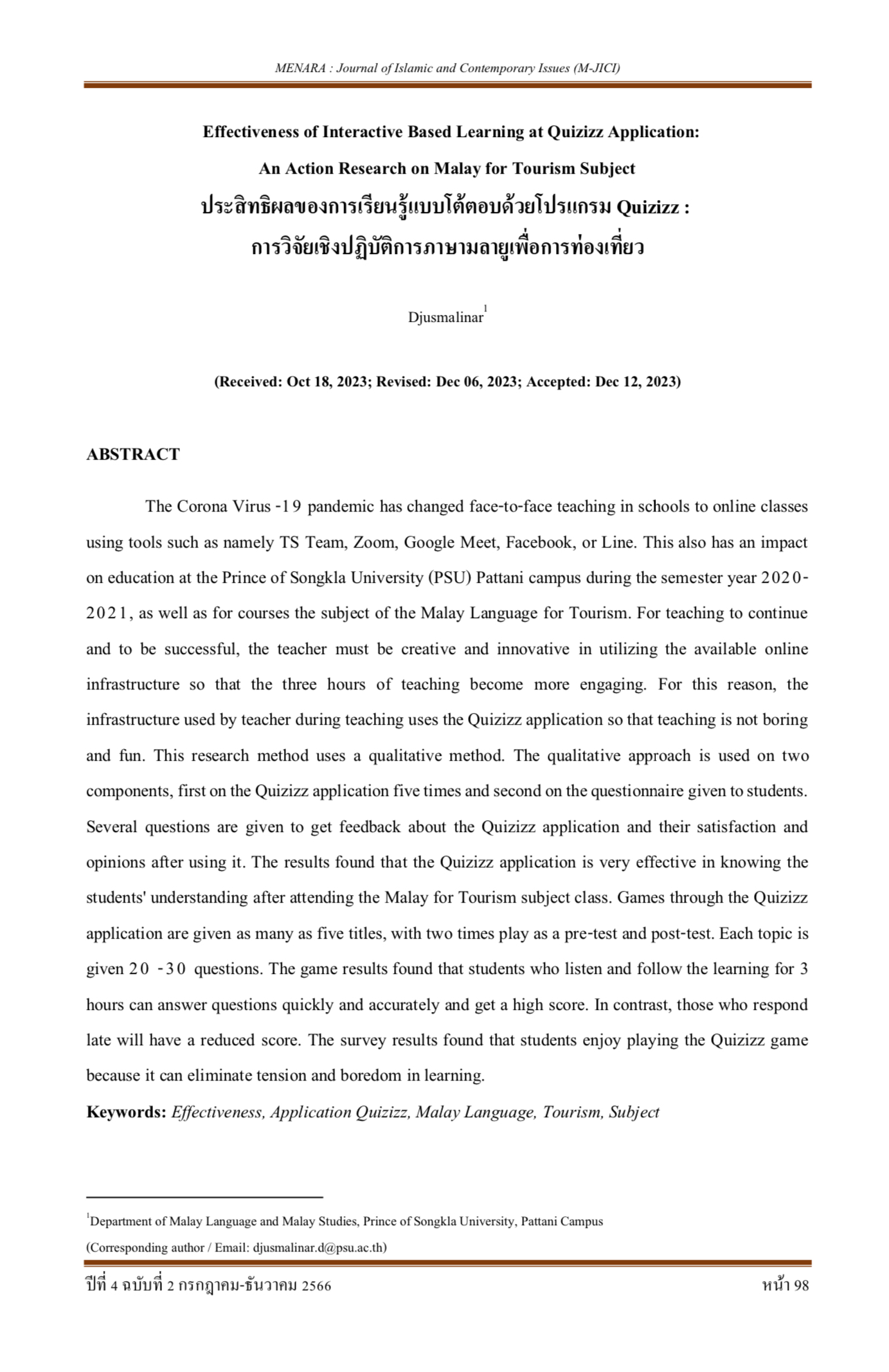Effectiveness of Interactive Based Learning at Quizizz Application: An Action Research on Malay for Tourism Subject
Keywords:
Effectiveness, Application Quizizz, Malay Language, Tourism, SubjecAbstract
The Corona Virus -19 pandemic has changed face-to-face teaching in schools to online classes using tools such as namely TS Team, Zoom, Google Meet, Facebook, or Line. This also has an impact on education at the Prince of Songkla University (PSU) Pattani campus during the semester year 2020-2021, as well as for courses the subject of the Malay Language for Tourism. For teaching to continue and to be successful, the teacher must be creative and innovative in utilizing the available online infrastructure so that the three hours of teaching become more engaging. For this reason, the infrastructure used by teacher during teaching uses the Quizizz application so that teaching is not boring and fun. This research method uses a qualitative method. The qualitative approach is used on two components, first on the Quizizz application five times and second on the questionnaire given to students. Several questions are given to get feedback about the Quizizz application and their satisfaction and opinions after using it. The results found that the Quizizz application is very effective in knowing the students' understanding after attending the Malay for Tourism subject class. Games through the Quizizz application are given as many as five titles, with two times play as a pre-test and post-test. Each topic is given 20 -30 questions. The game results found that students who listen and follow the learning for 3 hours can answer questions quickly and accurately and get a high score. In contrast, those who respond late will have a reduced score. The survey results found that students enjoy playing the Quizizz game because it can eliminate tension and boredom in learning.
References
Amirul Mukminin Mohamad. (2020). Quizizz sebagai E-Penilaian Norma Baharu terhadap Penutur Antarabangsa dalam Kursus Bahasa Melayu. PENDETA Journal of Malay Language, Education and Literature, 11 (Edisi Khas): 80-92.
Arsyan Allbie Armando Brahmana. (2022). The Implementation of Quizizz in Vocabulary Learning Activities: EFL Student Perception and Motivation. E-Journal RETAIN (Research on English Language Teaching in Indonesia), 10(01): 172-178.
Dewi, C. K. (2018). Pengembangan Alat Evaluasi Menggunakan Aplikasi Kahoot pada Pembelajaran Matematika Kelas X. Skripsi S1. Raden: Fakultas Tarbiyah dan Keguruan Universitas Islam Negeri Raden Intan Lampung.
E. Slavin, Robert. (1995). Cooperative Learning: theory,research, and practice-Second Edition: USA: Allyn & Bacon.
Flew, T. (2008). New Media: an introduction. New York: Oxford University Press.
Heinich, R. et. al. (2002). Instructional Media and Technologies for Learning. New Jersey: Simon & Schuster Company Engelwood Cliffs.
Henry, S. (2010). Cerdas dengan Game. Jakarta: PT Gramedia Pustaka Utama.
Mishbah Ulhusna, Syelfia Dewimarni, and Lili Rismaini. (2021). Sosialisasi Quizizz sebagai Media Pembelajaran Berbasis Digital pada Masa Pandemi. Jurnal Pengabdian Kepada Masyarakat, 1 (2): 156-165.
Purba, Onno W. (2019). Membangun E-Learning. Jakarta: Elex Media Computindo.
Rosenberg, Marc. J. (2001). E-Learning: Strategies for Delivering Knowledge In The Digital Age. USA: McGraw-Hill Companies.
Sari, D.P., Putra, R.W.Y., & Syazali, M. (2018). Pengaruh Metode Kuis Interaktif terhadap Kemampuan Pemecahan Masalah Matematis Mata Kuliah Trigonometri. Jurnal Pendidikan Matematika, 12(2): 63-72.
Yanawut Chaiyo and Ranchana Nokham. (2017). The Effect of Kahoot, Quizizz and Google Forms on the student's perception in the classrooms response system. International Conference on Digital Arts, Media and Technology (ICDAMT): 178-182.

Downloads
Published
How to Cite
Issue
Section
License
Copyright (c) 2023 MENARA : Journal of Islamic and Contemporary Issues

This work is licensed under a Creative Commons Attribution-NonCommercial-NoDerivatives 4.0 International License.


